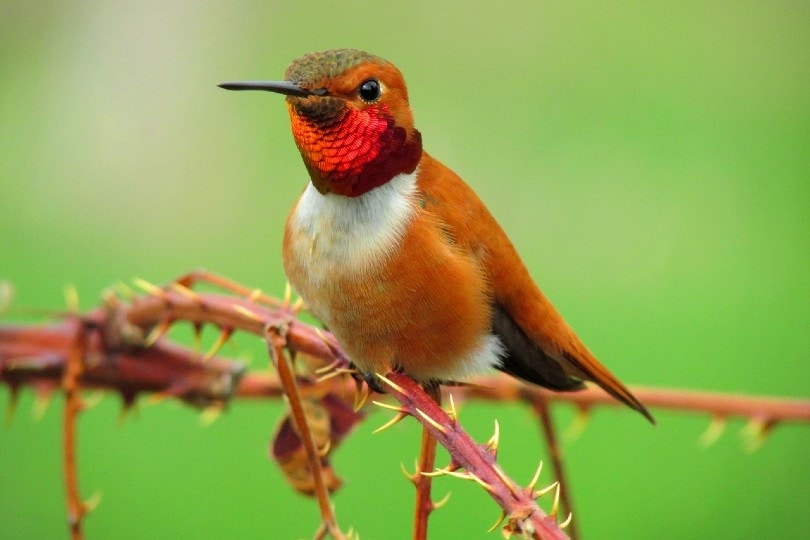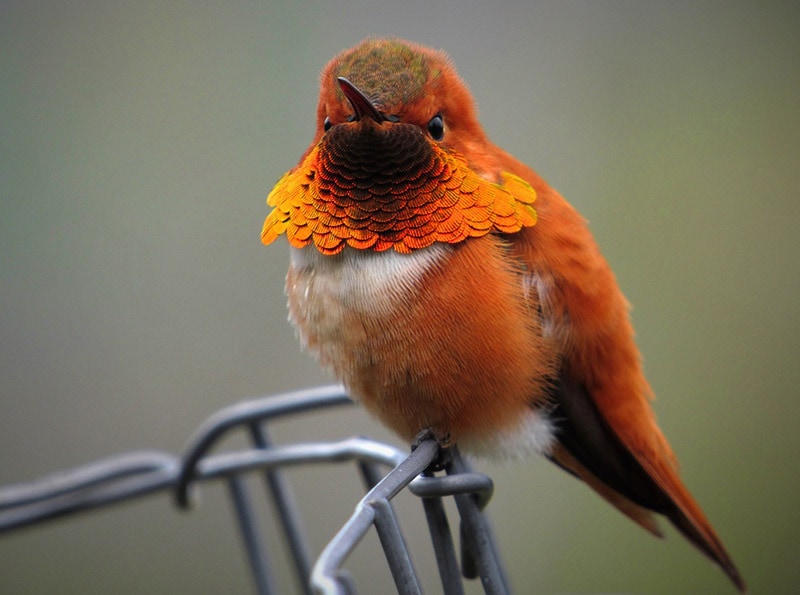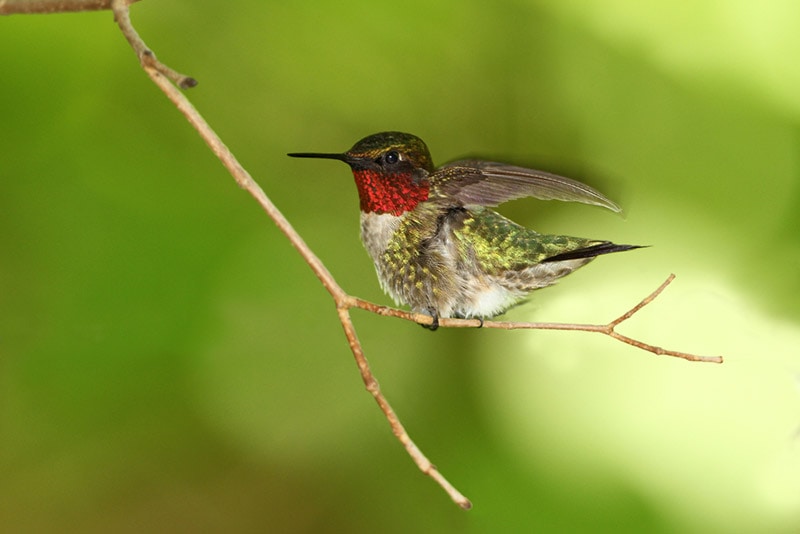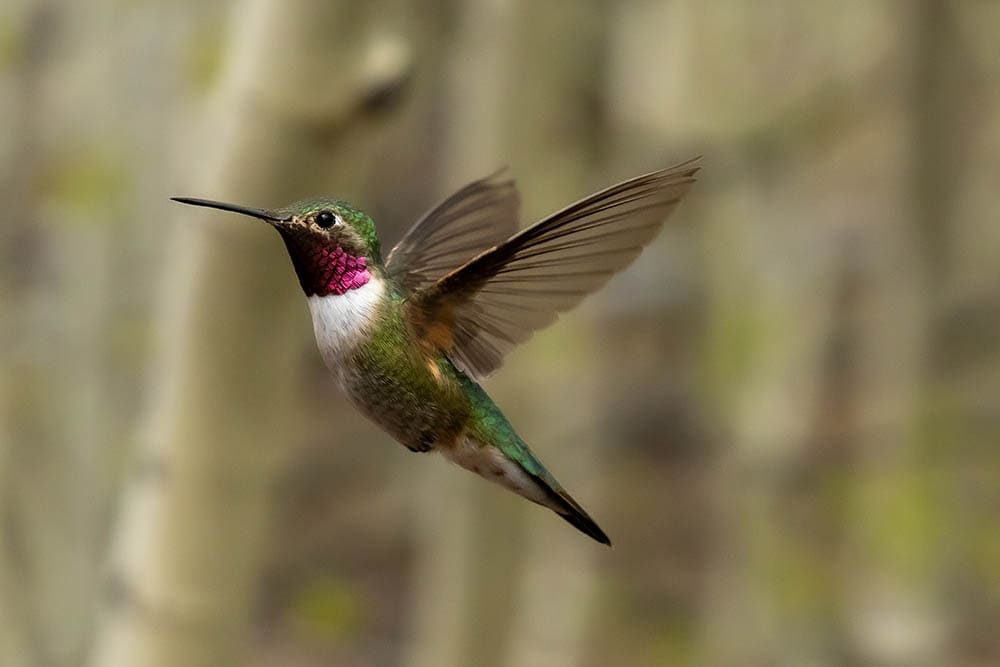5 Types of Hummingbirds in West Virginia (With Pictures)
Last Updated on

Hummingbirds are among the most stunning birds on the planet, and they are not typically seen in West Virginia. However, you can still occasionally encounter hummingbirds in the state because many of them migrate to spend the winter in the Gulf Coast area. Since hummingbirds are so rare in this part of the U.S., many people need help recognizing and identifying the different types.
So, what hummingbirds can you find in West Virginia? How can you identify them?
Keep reading to learn more about the types of hummingbirds in the Mountain State, their characteristics and traits, and how to recognize them among other birds.

The 5 Types of Hummingbirds in West Virginia
1. Rufous Hummingbird

| Species: | Selasphorus rufus |
| Weight: | 0.1–0.2 ounces |
| Length: | 2.8–3.5 inches |
| Female Appearance: | Orange-green bodies, green tails, white bellies |
| Male Appearance: | Bright orange bodies, red throats, white bellies |
Rufous Hummingbirds (Selasphorus rufus) are migratory birds that breed in the north of the U.S. during summer and migrate to the south during winter1. Although these hummingbirds typically spend their winters in the south, they have become common in the southeast U.S., especially in the Gulf Coast area. Due to the proximity to that area, Rufous Hummingbirds can wander off to West Virginia.
These birds are tiny, commonly being between 2.8 and 3.5 inches long and weighing around 0.1–0.2 ounces2. You can easily recognize this hummingbird by its stunning colors; the male is bright orange, with a red throat and white belly, while the female is orange-green, with a green tail and white belly.
Rufous Hummingbirds are territorial and will always chase away other hummingbirds to protect their territory. They mainly feed on small insects and nectar and can be found in various habitats, such as open areas, parks, yards, and forests.
Rufous Hummingbirds will occasionally visit backyards if there are plenty of flowers or feeders provided. The only downside is that they will probably chase other birds off due to their territorial nature.
2. Ruby-Throated Hummingbird

| Species: | Archilochus colubris |
| Weight: | 0.1–0.2 ounces |
| Length: | 2.8–3.5 inches |
| Female Appearance: | Pale-green throats, emerald-green bodies |
| Male Appearance: | Ruby-red throats, emerald-green backs, white-gray belly parts |
The Ruby-Throated Hummingbird (Archilochus colubris) is the only hummingbird species that spends the breeding season in the east of North America, so you can commonly encounter these hummingbirds in West Virginia.
These hummingbirds are small, their body length is between 2.8 and 3.5 inches, and they weigh between 0.1 and 0.2 ounces. The males are recognizable by their ruby-red throats, emerald-green backs, and white-gray belly parts. Compared to the males, female Ruby-Throated Hummingbirds are slightly dull: Their throats are pale green, while their bodies are emerald green.
Ruby-throated hummingbirds are friendly and love visiting bird feeders. They typically live in grasslands, forest edges, meadows, open woodlands, gardens, backyards, and parks. When in search of food, they will often hunt insects in flight or feed on bird feeders.
If you want to attract the Ruby-Throated Hummingbird to your backyard, you should plant tubular plants and set up bird feeders with seeds and insects. Also, provide a source of water, and ensure that the feeders are high enough to prevent possible issues with cats and other animals.
3. Black-Chinned Hummingbird

| Species: | Archilochus alexandri |
| Weight: | 0.1–0.2 ounces |
| Length: | 3.5 inches |
| Female Appearance: | Mixture of black, yellow, and green bodies, pale white bellies with small markings, long emerald-green bills |
| Male Appearance: | Black heads, black throats, long bills |
Black-Chinned Hummingbirds (Archilochus alexandri) are a rarity in West Virginia, but there have been a few sightings of these lovely birds in the past. They typically live in the west of the U.S. and even Canada, but they migrate to the Gulf Coast, which is probably why they sometimes wander away to West Virginia.
Unlike most hummingbirds, this species is not that colorful. The males have black heads and throats with black wings and long bills. The females have bodies of a mixture of black, yellow, and green, combined with pale white bellies with small markings. Their bills are emerald green and are typically longer than the males’.
These hummingbirds are also quite protective of their territory and will try to chase away other birds. They mainly feed on insects during flight and live in areas such as mountainous forests, lowland deserts, and urban areas.
You can attract the Black-Chinned Hummingbird to your backyard by providing feeding stations. Like other hummingbirds, they need insects, flowers, and fresh water, so ensure that you provide everything to increase the chances of attracting them to your yard.
Since Black-Chinned Hummingbirds are territorial, they will likely chase away any other type of bird that may want to use the feeding stations. If you like to host multiple bird species simultaneously, this hummingbird may not be the best option for your backyard.
Also, remember that they are a rarity in West Virginia, so they may never actually visit.
4. Mexican Violetear (Green Violet-Ear Hummingbird)

| Species: | Colibri thalassinus |
| Weight: | 0.2–0.3 ounces |
| Length: | 3.8–4.7 inches |
| Female Appearance: | Dark emerald-green bodies, blue cheeks and bellies |
| Male Appearance: | Dark emerald-green bodies, blue cheeks and bellies |
Mexican Violetars (Colibri thalassinus), formerly known as Green Violet-Ear Hummingbirds, are among the most colorful hummingbirds that you can encounter in West Virginia. This species is native to Mexico, but it has been reported various times in the eastern and southeastern parts of the U.S.A.
These hummingbirds are the largest species on this list, with their length ranging between 3.8 and 4.7 inches and their weight between 0.2 and 0.3 ounces. They have dark emerald-green bodies, with blue cheeks and bellies and black wings. The females and males are similar, so it can be hard to distinguish between them.
Although you may spot a Mexican Violetear in West Virginia occasionally, you likely won’t be able to attract these hummingbirds to your backyard because they are quite rare.
However, you can still try planting plenty of flowers and providing bird feeders and fresh water.
5. Broad-Tailed Hummingbird

| Species: | Selasphorus platycercus |
| Weight: | 0.2 ounces |
| Length: | 3.5 inches |
| Female Appearance: | White bellies, greenish/blue backs and wings, black underwings |
| Male Appearance: | Magenta necks, bright green heads and backs, rosy-gray underwings |
Broad-Tailed Hummingbirds (Selasphorus platycercus) mainly live in central and west America, but they visit the Gulf Coast area when they migrate, so it’s not uncommon for this species to wander around the territory of West Virginia.
These hummingbirds are small and have long bills and big heads. You can easily recognize the males of this species due to their colorful magenta necks. Their heads and backs are bright green, while their underwings are rosy gray. The females have white bellies, greenish/blue backs and wings, and black underwings.
You can commonly find the Broad-Tailed Hummingbird in oak woodlands, evergreen forests, high meadows, and shrubby habitats.
Adding flowers and providing bird feeders and sugar water are ideal for attracting the Broad-Tailed Hummingbird to your backyard. Although the chances are much higher in their native area, if you provide the right conditions, a Broad-Tailed Hummingbird might just visit.

Conclusion
Every type of hummingbird that you can encounter in West Virginia is different. The most common one is the Ruby-Throated Hummingbird, while the other species are rarer. You can try providing their favorite flowers and foods in your backyard, and you might get a chance to see one of these magnificent hummingbirds in person.
Featured Image Credit: Avia5, Pixabay
About the Author Visnja Radosavljevic
Visnja is a creative, adaptable content writer that covers various topics such as DIY, pets, home improvement, travel, gardening, and more. As a young mom and a college student, she didn’t have enough time to balance her personal and work life, so after multiple years of working a regular 9 to 5 job, she decided to pursue her passion and make a living out of it. She has been writing for a couple of years now, helping people to find valuable and interesting information online.
Related Articles:
Monocular vs Telescope: Differences Explained (With Pictures)
10 Types of Hummingbirds in Arkansas (With Pictures)
8 Types of Hummingbirds in Nebraska (With Pictures)
5 Types of Hummingbirds in Idaho (With Pictures)
3 Types of Hummingbirds in Mississippi (With Pictures)
8 Types of Hummingbirds in Kansas (With Pictures)
5 Types of Hummingbirds in Ohio (With Pictures)
Where Do Nuthatches Nest? Nuthatch Nesting Habits Explained
